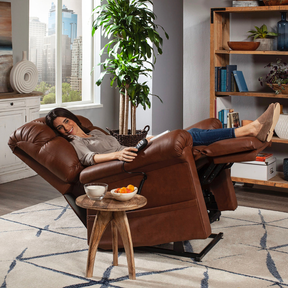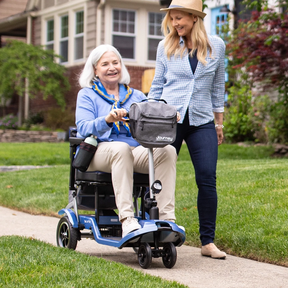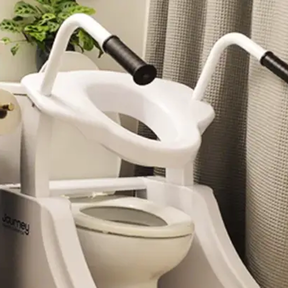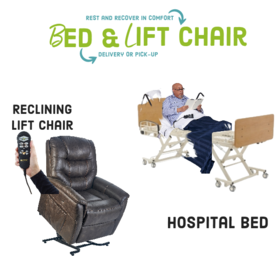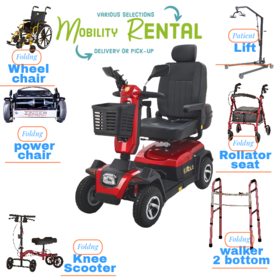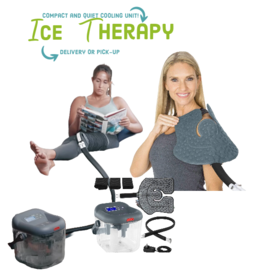Blog Placing Lift Chair: Why You Should Avoid Placing It Upstairs or a Hospital Bed in the Bedroom
Placing Lift Chair: Why You Should Avoid Placing It Upstairs or a Hospital Bed in the Bedroom
When planning your recovery process, placing a lift chair in the right location is crucial for comfort and safety. Many homes are split-level or bi-level, with bedrooms often located upstairs or in the basement. While these layouts are common, they present challenges when placing a lift chair or a hospital bed, especially for individuals with mobility concerns. The last thing you want is to struggle with accessibility during recovery when comfort and ease should be prioritized.
Whether you're recovering from surgery, managing a chronic condition, or assisting a loved one, careful planning about where to place a lift chair can make a world of difference. You can explore a range of lift chairs suited to your recovery needs here.
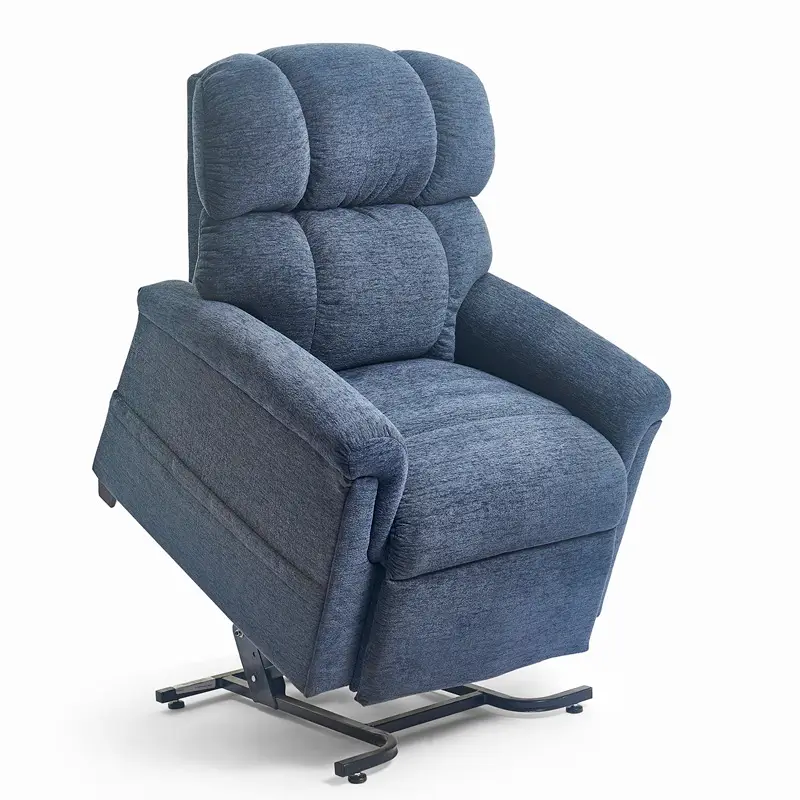
Challenges of Placing a Lift Chair in Inconvenient Locations
If you’re recovering in a multi-level home, placing a lift chair in areas with stairs can create obstacles. Moving large pieces of furniture upstairs, like a lift chair or hospital bed, requires extra effort and resources. Once installed, it may still cause issues with mobility, especially when ascending or descending stairs frequently is not an option. For those who are recovering from surgery or illness or have limited mobility, stairs can become a dangerous obstacle, increasing the risk of falls and accidents.
Additionally, placing a hospital bed or placing a lift chair in an upstairs bedroom can limit your access to essential areas of your home, such as the kitchen and bathroom. When you're recovering, having easy access to these areas is crucial for maintaining independence and hygiene. A lift chair placed upstairs, for example, can make it harder to get around and might cause you to feel isolated from the rest of the home.
Key Considerations When Placing a Lift Chair in Your Recovery Space
- Accessibility and Mobility: The primary goal of your recovery space is ease of movement. Placing a lift chair in a location that allows for easy entry and exit is essential. If stairs are involved, it's best to avoid moving the chair to an upper level altogether. Instead, choose a ground-floor location that is close to key rooms, such as the bathroom and kitchen, ensuring you can easily reach these areas without added strain.
- Interaction with Family and Pets: If you're living with family members—spouses, children, or elderly relatives—placing a lift chair in a shared, accessible space can help maintain social interaction during your recovery. However, if you have toddlers or pets, it may be wise to place your chair in a more secluded spot to avoid disruptions. Toddlers and pets may not understand your need for rest and could unintentionally disturb your peace, so a quiet, closed-off space might be best.
- Close Proximity to Essentials: For optimal recovery, it’s important to be near food, water, and bathroom facilities. Placing a lift chair in a space that provides quick access to these necessities allows you to maintain regular eating and bathroom habits, both of which are key to a successful recovery. A nearby location ensures that you don’t feel stranded and that you can access what you need even when you’re not feeling your best.
- Creating a Safe and Clean Environment: Recovery can involve bodily discharges or other challenges that require easy access to hygiene products. Placing a lift chair close to the bathroom or other essential items like towels and disinfectants helps maintain cleanliness and avoid cross-contamination. If you don’t have a caregiver, ensure the chair is placed where you can independently access everything you need, including food, bathroom facilities, and items to keep you entertained, like books or a TV.
Why Ground-Floor Placement is Ideal for Lift Chairs
Given these considerations, the ideal place for a lift chair is often a ground-floor room that provides both privacy and accessibility. Placing it on the same level as your kitchen and bathroom allows for greater independence and reduces the risk of falls or accidents associated with climbing stairs. Additionally, choosing a central, accessible location for your lift chair will make it easier for caregivers to assist you if needed, without having to navigate stairs or narrow hallways.
For example, if you’re recovering from hip surgery or another procedure that limits your mobility, placing the lift chair in a ground-floor living room allows you to remain part of the household's daily activities without straining yourself. It also provides a more comfortable environment for visitors or family members to spend time with you.
Additional Tips for a Comfortable Recovery
Aside from placing a lift chair in the right spot, there are other key factors to ensure your recovery space is optimized. For instance:
- Lighting: Make sure the area is well-lit to prevent trips or falls, especially if you’ll be getting in and out of the chair frequently.
- Clutter-Free Zone: Keep the area around your lift chair free from clutter to avoid accidents. Tripping over items while trying to sit down or stand up could hinder your recovery.
- Temperature Control: Ensure that the space has good ventilation or temperature control. Recovery can sometimes lead to temperature sensitivity, so having easy access to fans, heaters, or blankets will help.
By carefully placing a lift chair and optimizing your recovery space, you’re setting yourself up for a more comfortable and efficient healing process. Each milestone you reach can then be celebrated in a safe, accessible environment, allowing for a smoother transition back to your normal routine.
The FDA defines a home medical device as one specifically designed for use outside healthcare facilities, such as hospitals or clinics, to support patient care in a home environment. These devices enable patients and caregivers to manage health conditions and administer treatments with added comfort and convenience.
Primary users of home medical devices include:
- Patients: Individuals who use the device directly for personal care.
- Caregivers or Family Members: Those who assist patients in using and maintaining the device, ensuring safe and effective usage.
- Qualified Healthcare Professionals: Skilled individuals, either licensed or unlicensed, who train patients and caregivers on the proper use and upkeep of the device.
The FDA regulates these devices to ensure they are safe and effective for home use, where professional supervision may be limited.
Advances in medical device technology have made devices more compact and portable, enabling a wider range of treatments to be conducted at home, reducing healthcare costs, and enhancing quality of life for care recipients. For instance, mobility aids like wheelchairs promote independence and reduce the need for direct caregiver intervention. However, to ensure safety and effectiveness, it is essential that a device be compatible with the abilities, environment, and lifestyle of both the patient and caregiver.
Potential risks associated with using medical devices at home include:
- Knowledge and Training Gaps: Lack of proper training can lead to misuse or failure to recognize device issues, posing safety risks.
- Environmental Hazards: The home setting can introduce challenges such as limited space, children or pets, electromagnetic interference, sanitation concerns, and other safety risks like clutter. Environmental factors like noise, air quality, temperature, and humidity can also impact device performance.
- Emergency Preparedness: Unlike healthcare facilities, homes may not have backup power, water supply, or staff trained to handle emergencies, which can be critical during power outages or natural disasters.
Device Usability Challenges: Many home care devices are outdated and may lack clear labeling or instructions, making them difficult for untrained users to operate safely. Even when manuals are provided, the information can be complex and not tailored for lay users. Additionally, patients may not have input into the specific brand or model best suited for their home needs, as physicians may not account for this in their recommendations, leaving patients dependent on suppliers who may prioritize certain brands over others.
Tags
- contest
- event
- supplies
- design
- brand
- video
- Compression
- upright walker
- four wheel walker
- rollator
- wheelchair
- Ostomy
- elegantly
- elegantly
- accessibility
- Mobility
- knee walker rental
- knee scooter sales
- knee scooter
- post operative shoe
- anti-embolic stockings
- pain management
- cryotherapy therapy
- hot cold compress
- compression stockings
- lift chair
- wound Care
- air purifier
- fall prevention
- cushion
- oxygen therapy
- cpap, bipap
- Hospital Bed
- Life Aide
- EMS
- recovery
- splint
- knee brace
- Bathroom
- patient lift
- medical supply
- Wound dressings
- Lightweight Wheelchair
- hospital beds for sale
- sky medical supplies rentals
- compression socks
- Adult Diapers
- Rollator Walker
- Bed Wedge Pillow
- Hospital beds
- Patient Lifts and Slings
- Portable Oxygen Concentrator
- Patient Lift Slings
- knee scooter rental
- folding mobility scooter
- mobility scooter
- medical shoes
- raised toilet seat
- hospital beds for rent
- lift chair recliner
- chair lift
- electric wheelchair
- Power Lift Recliners for Elderly
- Senior Walkers
- Bedside Commodes
- whill wheelchair
- compression hose
- Whill Electric Wheelchairs
- Bariatric Wheelchair
- Recliner Chairs with Lift
- Colostomy Bag
- Crutches
- Medical Wedge Pillow
- skin barrier tape
- Post Surgery Ice Machine
- Bedside Commode
- chair lift recliners
- cane holder scooter
- lift chair prices
- drop arm commode
- rollator walker with ergonomic seats
- Hospital Bed Rental
- Wheelchair Tray
- Golden Technologies Lift Chair
- Nova GetGo Junior Rollator
- power lift recliners
- Knee Scooters and Crutches:
- stand up walker for seniors
- stand up walker as seen on TV
- Women's Walking Canes
- Knee Immobilizers
- Bed Wedge Pillow
- Medical Supply Stores
- Sit to Stand Lifts
- Grab Bars
- Compression Gloves
- incontinence bed pads
- Lift Reclining Chair
- Knee Walker Scooters
- Hernia Belt Near You
- Mobility Scooter Stores Near Me
- Folding Knee Walker
- Oxygen Concentrator Store
- Inogen Battery
- Electric Bed Frames
- Placing Lift Chair
- diaper brief
Related Posts
Get weekly articles in your inbox on the latest medical supply news, exclusive deals, and helpful health tips.
